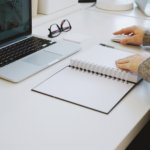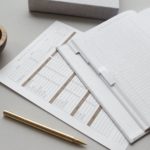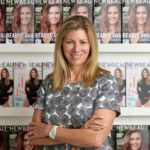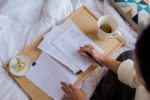Leah Ginsberg and I met when I became a contributor at Forbes’ new vertical, Women@Forbes. According to Christina Vuleta, the editor of Women@Forbes, the site is “committed to helping every woman take her next step forward. Because every step forward a woman makes is a step forward for all women…and the economy. We believe that if every woman on the rise today keeps taking steps forward, we can break the future…and create the change we want to see.” Leah’s career is a testament to the fact that, as Sheryl Sandberg says, your career is a jungle gym, not a ladder. Leah went from journalism to law then back to journalism. She is currently the deputy editor of the Women’s Digital Network at Forbes.
How did you end up at Forbes?
For most of my career, I was an editor and writer for print magazines. I worked my way up, basically. Then in 2014, while I was executive editor at PeopleStyleWatch (now just StyleWatch — a monthly mag), I got the opportunity to join Yahoo and work for one of its newly launched digital magazines. The industry was changing so much, I really wanted to get more digital experience. (Plus, as a bonus, the job was at Yahoo Travel, which meant I would get to travel every few weeks.) Then two years later, Yahoo closed almost all of its sites (including Travel), because the company was being sold. My team and I were axed. But I ended up really loving the pace and possibilities of digital, so I decided to stick with it for my job search. When I first interviewed for this job with my now boss, I really loved the mission of Women@Forbes and wanted to be a part of it.
How did you make the shift from the legal industry to media?
I was an editor for about nine years before I went to law school. I put myself through law school (the fast two and a half year plan) while freelancing. After law school, I became a prosecutor, but it was too depressing. So I only did that for a few years and then went back to editorial.
What is a workday as Leah like? Please walk me through a day!
I read the news and competitor sites on the subway to work. Then, in the office, my days are mostly spent in front of the computer, working with contributors and staff. I also do a lot of networking meetings (morning coffees and after-work drinks) and go to a lot of events to find new contributors and to keep up with what’s going on in the industry.
What are your responsibilities as deputy editor of the Women’s Digital Network at Forbes?
I manage the writers and staff and help grow the network.
How did you land your role?
A former boss of mine interviewed for the position initially. It wasn’t right for her, but she suggested me for the role.
What are the most important characteristics someone needs to have to be successful in your role?
To be the editor of a digital property, you have to be efficient, forward-thinking, creative, open to new ideas, flexible, and cool with a high-paced environment. Things are always changing, but that’s what makes it so fun! I like controlled chaos, which is basically what digital media is.
What are the most important skills for doing your job and how did you develop them?
Writing and editing are each part skill, part talent. I’ve honed the skill part over the years, just doing it day in and day out, and working with other amazing editors and writers. Also, I read the work of journalists I admire. And I try to stay well-informed – you need to know what’s going on in your industry and in the world.
What’s the biggest lesson you learned at work and how did you learn it?
There are so many, I’m not sure where to start, but some that stand out: What you do is not who you are. You have to advocate for yourself. Don’t listen when someone tells you it can’t be done. Your name is on that. Embrace change. Know yourself and work in a way that maximizes your strengths. Healthy eating and working out really do make you more productive (not that I’ve perfected that one).
What is one thing that you wish you had known when you were starting out your career?
It’s okay to make mistakes. I also wish I knew that imposter syndrome was a thing — I thought it was just me. And I think I did know this, but it’s very import to enjoy your work.
What are you reading right now?
I pretty much only read non-fiction, and I’m always in the middle of like 12 things at once, because — Kindle. My friend (Jo Piazza) gave me a sneak peek of a book she’s writing called How To Be A Wife, which comes out early next year. It’s really good. I’m also reading The Girl with the Lower Back Tattoo and The Hard Thing About Hard Things: Building a Business When There Are No Easy Answers. And a book called Confederates in the Attic: Dispatches from the Unfinished Civil War). It’s non-fiction, about these people in the South who literally still live the confederacy, like the war was never lost. It’s fascinating and terrifying. I was in Charleston this summer and became a little obsessed with the Civil War.
What is the best advice you’ve ever received?
You can be or do anything you want. Whether or not it’s 100% true, doesn’t matter. My dad always told me that my whole life, so I believed it. It powered me through a lot.
Image via Forbes and Leah Ginsberg.
































15 Responses to Career Profile: Leah Ginsberg, Forbes